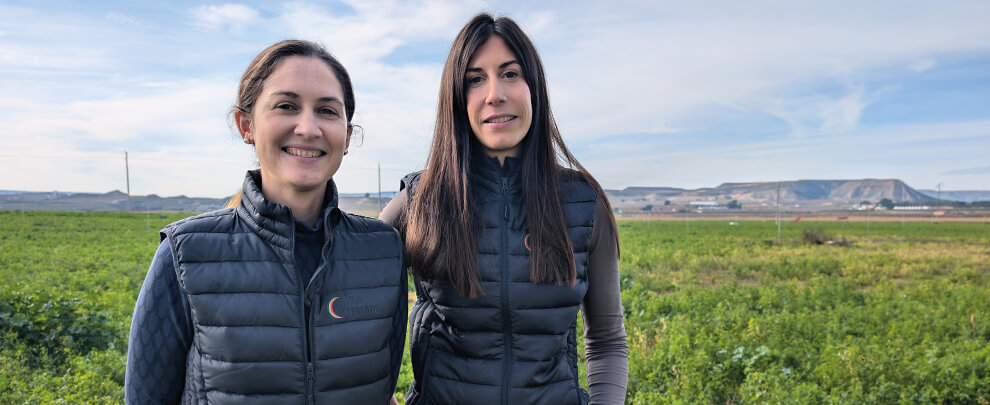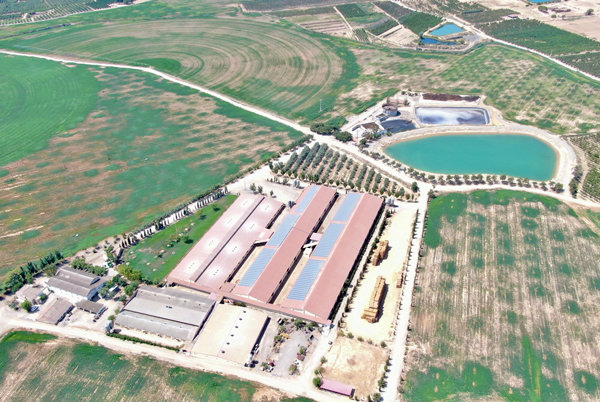Blog
Blog

Tradition, innovation and generational renewal on the family farm
12th December 2024 - News
The trajectories of Neus and Alba Serentill were very different until a year ago when they decided to join forces to continue managing the family farm that his grandfather had founded for over 70 years. The protagonists of the film produced by INTERPORC, The Year of the Relay, Neus, are always clear about their links with the countryside. At the same time, Alba found her passion for the sector after discovering the impact of technology on pig production. Together, they have balanced tradition and innovation to boost the family business and keep its legacy alive, betting on a quality future in the rural world.
At what point and why did you decide to take charge of the farm?
Neus (N): I've always had a very close bond with the farm, and it's been clear that I wanted to be here. As a child, I liked being with my grandfather, who worked in the maternity hospitals, and then I realised the importance of continuing with the family legacy. It wasn't just because I liked this job; it was also because I wanted to instil in my children the country culture that I had been taught and thus honour my grandfather, and because I wished to my vision for the family business. Ultimately, it was a natural decision driven by our love for the work and the desire to move forward for something our family had built.
Alba (A): My case was quite different. I studied advertising in Barcelona, and at the end of my studies, I went to live in London, and then I spent several years working in companies linked to my studies. I never considered working on the farm until 2022, when I accompanied my family to EuroTier. There, I realised how the pig sector has become more technical, how digitalisation penetrates it, and how innovative it has become. From here, I began to be more interested in attending technical conferences, and in 2023, I was fully incorporated into the business.
What was the process of taking the reins of the family farm like?
N: Long and challenging. Over time, we have gained experience and felt more capable of leading the business. However, it has been a path marked by important decisions and by the learning acquired from some mistakes that have allowed us to improve. Then, the day-to-day has been key since facing the daily challenges that can exist on a farm; we have learned to manage the different areas of the farm. Ultimately, it has been a process of personal and professional maturation in which experience has given us the confidence to continue with the business. Fortunately, we still have our father's support, which provides us with a lot of security.
What have you maintained, and what have you changed?
N: We have maintained all the cleanliness, order and handling protocols. My father implanted them, and he has instilled them in us. He has always said that a farm should be like a five-star hotel. So, we have not touched on these procedures because they help us improve the farm's biosecurity and reduce the risk of diseases entering.
A: Of the changes we have applied, I would highlight the improvements in technification. We have sensitised the feeding silos and water tanks, we have installed electronic feeding systems in the farrowing wards, we have automated ventilation and cooling with cloud data systems, we have piglet counters for weaning, and we have the farms ready to access remotely in case of breakdown, we are also digitising the water and electricity meters to detect breakdowns and reduce consumption, and we also have cleaning robots to clean the facilities. On the other hand, we have changed the production system of one of the farms, moving to five-week bands.
What is your day-to-day life like on the farm?
A: Every day is different, making it dynamic and enriching. Neus is in charge of the financial and strategic parts, while I am in the areas of production and human resources, although I am still training in this world. In the end, we have everything quite divided. We have a manager on each farm, and we enter the farms several times a week to control the production data, but we need to work in the rooms daily.

Aerial view of the family farm. Photo: Serentill Farm.
What aspects of the pork sector most attracted you when continuing this activity?
N: Working in the maternity wards made me fall in love with this sector: attending a birth, feeding the sow afterwards, taking care of her piglets from birth to leaving, etc. Today, if among all the tasks carried out on a farm, I had to choose one, it would be working in maternity wards since it was the first thing I did in the family business, and I have incredible memories of that stage.
A: Working with animals is exciting. During my training on the farm, I spent a season working within the different production areas to get to know the whole cycle, and there were time flies. It is an excellent job, especially in maternity wards. Then, being linked to a rural environment is a plus. Coming to work in an environment like this is very rewarding. Finally, there is the issue we have discussed: the sector is no longer as it was; now, it is much more technical, and this is another of the appeals that made me wager on staying here.
What does it mean to you to keep this family tradition alive?
N: For us, it is very gratifying and of great value to keep something our grandfather created alive, and our father made grow. It is an opportunity to transmit to the future generations of our family what they have instilled in us, the hard-working and fighting spirit, and the passion for maintaining the viability of the family business by applying the improvements that exist in the sector while remaining sustainable.
What message would you give other young people considering taking over in the livestock sector?
A: I encourage them to do so because we are in an exciting sector, full of possibilities and with a gratifying job. I would tell them to commit if they have a family business. Although initially hesitant, it was one of the best decisions I have ever made. After working in private companies, what I do now is motivating and enriching.
What do you think is the current perception of this sector in society?
A: The existing perception is quite complex. Growing concerns about the environment and animal welfare and changes in food trends greatly influence it. However, a lot is unknown about what we do and how we do it, and there are many prejudices regarding the rural world, especially in large cities. To reverse this situation, we must communicate well, which is a task that everyone involved in this sector must address. In our case, in addition to participating in the Interporc film that addresses the problem of generational renewal, we have also created a profile on social networks where we show the activity of our company. As part of the industry, we have an essential enough responsibility to be heard.
Is more support needed from institutions so that more young people and families choose this path?
N: Yes, without a doubt. They must give us more support, especially the new generations and those young people with a vocation for livestock farming who are overwhelmed by economic and bureaucratic difficulties and a lack of resources that make it challenging to embark on this path. Institutions have a key role to play in facilitating this transition. Aid is needed to modernise farms, programmes to support generational succession and tax incentives to make the sector more attractive. In addition, it is essential that the work done by family farms is recognised and that their contribution to the local economy is given visibility. For all these reasons, supporting institutions is necessary and key to guaranteeing the continuity of a vital sector for society.






